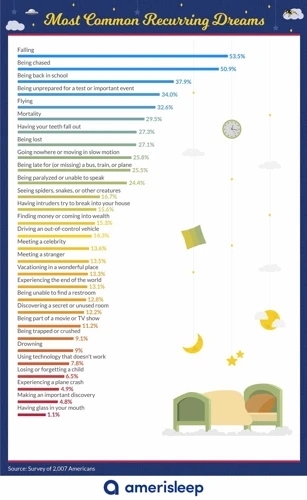Have you ever experienced the feeling of déjà vu in your dreams – the sense that you have been in a particular situation before, but can’t quite put your finger on it? Recurring dreams can be both fascinating and perplexing, leaving us to wonder what they might be trying to tell us. In some cases, they could be glimpses into our past lives. Past lives? Yes, you read that right. According to the concept of reincarnation, our souls have lived multiple lives before our current existence. This article explores the connection between recurring dreams and past lives, delving into how they relate to one another and how you can interpret and heal from these vivid dreams.
Contents
- What are Recurring Dreams?
- Past Lives and Reincarnation
- The Connection Between Recurring Dreams and Past Lives
- Interpreting Recurring Dreams
- Healing from Recurring Dreams
- Conclusion
-
Frequently Asked Questions
- Why do we have recurring dreams?
- Can recurring dreams be a sign of trauma?
- Do recurring dreams always have the same exact content?
- Can dreams really be a reflection of past lives?
- Can past life experiences affect our present lives?
- Is it common to remember past lives through dreams?
- What is the significance of common elements in recurring dreams?
- How can I interpret my own recurring dreams?
- Can healing from recurring dreams improve my overall well-being?
- Is it possible to completely stop having recurring dreams?
- References
What are Recurring Dreams?

Have you ever experienced a dream that seems to repeat itself over and over again? These types of dreams are known as recurring dreams. While they may seem insignificant, recurring dreams can actually carry significant meanings and implications for our waking lives. In fact, some researchers suggest that these dreams may be linked to past life experiences or unresolved traumas. In the following sections, we’ll explore the definition and types of recurring dreams, and dive deeper into the potential connections between these dreams and our past lives. For those who are interested in learning more about the psychological meanings behind these dreams, check out this article on the psychological meaning of recurring nightmares.
Definition of Recurring Dreams
Recurring dreams are distinctive dreams that repeat themselves with regularity. These dreams are often vivid and realistic, making it easy for the dreamer to recall them in detail. Recurring dreams are different from ordinary dreams because of their repetitive nature, which may occur over a period of weeks, months, or even years. These dreams can have various themes and symbols, but they often reflect unresolved issues in the dreamer’s subconscious mind.
Recurring dreams can sometimes be triggered by physical or emotional stress, changes in routine or environment, or traumatic life events. They can also be a sign of a deeper spiritual connection to one’s past lives. These dreams may involve repetitive scenes, characters, or events that may seem unrelated to the dreamer’s present life.
The recurrence of these dreams can be a source of distress for the dreamer as they may feel helpless in trying to stop them. However, it is important to understand that recurring dreams are not a random occurrence but are instead a reflection of the dreamer’s psyche. By identifying the underlying causes of these dreams, individuals can begin to address the issues that they represent and gain insight into their subconscious mind.
| Features of Recurring Dreams | Descriptions |
|---|---|
| Distinctive | Dreams that have a unique quality and stand out from ordinary dreams. |
| Regular | Recurring dreams that follow a specific pattern and occur with frequency. |
| Vivid | Dreams that are clear and memorable, often appearing real to the dreamer. |
| Different | Dreams that are distinguishable from ordinary dreams due to their repetitive nature. |
| Repetitive | Dreams that occur frequently over an extended period of time, possibly weeks or months. |
| Various themes | Dreams that may involve different settings, characters or symbols but which still retain a common theme. |
| Psyche reflection | Dreams that represent unresolved issues in the dreamer’s subconscious mind. |
| Triggered | Dreams which may be activated by changes in routine, traumatic events, or heightened emotions. |
Types of Recurring Dreams
Recurring dreams are a fascinating subject of study in the field of dream psychology. They can be classified into several categories based on their content and manifestation. Some types of recurring dreams are:
| Nightmares | Sexual Dreams |
|---|---|
| Nightmares are recurring dreams that cause a strong emotional response, usually fear or terror. They often result in the dreamer waking up in a state of panic or distress. | Sexual dreams involve recurring themes of sexual encounters or desires. They can sometimes cause discomfort or embarrassment in the dreamer upon waking up. |
| Flying Dreams | Chased or Attacked Dreams |
| Flying dreams are recurring dreams where the individual is able to fly or levitate. These dreams are generally associated with positive feelings of freedom and empowerment. | Dreams in which the dreamer is chased or attacked by a person, animal or supernatural creature are common recurring dreams that often lead to anxiety or fear. |
| Being Late Dreams | Lost and Frustrated Dreams |
| Being late dreams involve the dreamer being late for work, an appointment, or an event. These dreams are often associated with feelings of guilt or anxiety. | Dreams in which the dreamer is lost or unable to find their way are common recurring dreams. These dreams can cause feelings of frustration and confusion in the dreamer. |
It’s important to note that not all recurring dreams fall into these specific categories and that the themes and symbols in these dreams can vary widely from person to person. Understanding the types of recurring dreams and their meaning can be a useful tool in interpreting the messages our subconscious mind is trying to convey to us.
Past Lives and Reincarnation

The concept of past lives and reincarnation has captured the curiosity and imagination of people for centuries. Many wonder if we have lived before and if our experiences in past lives shape our current existence. Some believe that the recurring dreams we experience may provide a glimpse into our past lives, allowing us to uncover hidden memories and patterns. In this section, we will explore the topic of past lives and reincarnation, examining the evidence behind it and delving into the possibility of a connection between past lives and recurring dreams.
What is Reincarnation?
Reincarnation is a belief that many cultures and religions have adopted throughout history. It is the idea that after death, a person’s soul is reborn into a new body. This belief suggests that the soul is eternal and continues on after the body’s death.
Here are some key beliefs associated with reincarnation:
- The soul is separate from the body and is immortal
- After death, the soul goes through a transition period before being reborn
- Each soul has a unique purpose or lesson to learn in each lifetime
- The type of life a person lives is influenced by their past actions, also known as karma
- The rebirth process continues until the soul reaches a state of enlightenment or liberation from the cycle of birth and death
While reincarnation is not scientifically proven, many people believe in it based on their spiritual and cultural beliefs. It offers comfort and a sense of continuity after death, as well as a way to explain certain experiences or feelings in one’s current life. The idea of past lives provides an explanation for unexplainable fears or phobias, as well as certain talents or interests that seem to come naturally.
Evidence for Past Lives
There are many who would claim that past lives are real, but there are also those who believe that there is no scientific evidence to support such a claim. However, there are a few cases that have caught the attention of researchers and skeptics alike that provide support for the concept of past lives and reincarnation. Here are some examples:
| Case | Evidence |
|---|---|
| The Case of Shanti Devi | A young girl who claimed to have memories of a past life and was able to recall specific details and events from her supposed previous existence. Her claims were investigated and verified which lead to her being taken to her previous home and being able to recognize her previous husband and sons. |
| The Case of James Leininger | A boy who had recurring nightmares about being a WWII fighter pilot. He was able to recall specific details about his supposed past life, including the name of the aircraft carrier he flew from, the name of his commanding officer, and the circumstances of his death. His claims were investigated and verified. |
| The Case of Ryan Hammons | A boy who claimed to have memories of a past life as a Hollywood agent named Marty Martyn. He was able to recall specific names and details related to Marty’s life and career, and his claims were also verified. |
| The Case of Bridey Murphy | A book was published in 1956 detailing the supposed past life memories of a woman named Virginia Tighe, who claimed to have lived a previous existence as an Irish woman named Bridey Murphy. Some of her claims were later found to be inaccurate or inconsistent with historical records, leading to some skepticism about the case. |
While these cases provide some evidence for the idea of past lives and reincarnation, they are not enough to prove it conclusively. However, they do suggest that there’s more to the concept of past lives than pure speculation, and that there may be some basis in reality for these ideas.
The Connection Between Recurring Dreams and Past Lives

As we delve into the mysterious world of the subconscious mind, we begin to uncover fascinating connections between our dreams and past experiences. Recurring dreams are one such phenomenon that have intrigued psychologists and spiritualists alike for centuries. Many believe that these recurring dreams could be linked to past lives and reincarnation – a concept that is prevalent in many cultures around the world. In this section, we will explore the intriguing connection between recurring dreams and past lives, and how they might shed light on our hidden memories from past incarnations.
How Recurring Dreams Relate to Past Lives
Recurring dreams can be a signal of unresolved emotions or unresolved issues in past life experiences. It is believed that some dreams may actually be memories from a past life. These memories can be triggered by certain experiences or places in our current life that are connected to our past lives. For example, if you have recurring dreams about drowning, it could be a sign that you drowned in a past life.
In many cases, recurring dreams involve people or places that we don’t recognize in our current life. However, they can be related to people we knew or places we experienced in a past life. These dreams might be confusing, but they can provide us with insights into our past experiences.
It is important to note that not all recurring dreams are related to past lives. Sometimes, they are simply the result of unresolved emotions or experiences in our current life. However, past life experiences can often hold the key to understanding the deeper meaning of our recurring dreams.
Research has shown that people who experience recurring dreams tend to be more open to the possibility of past lives and reincarnation. They may have a strong sense of deja vu when they visit certain places or meet certain people. They may also have unexplained fears or phobias that are connected to past life experiences.
By exploring our recurring dreams and looking for patterns or connections to our past lives, we can gain a deeper understanding of ourselves and our life’s purpose. It can also help us to release any unresolved emotions or traumas that are holding us back in our current life.
The Role of the Subconscious Mind
The subconscious mind has a significant role in recurring dreams and their connection to past lives. Our subconscious mind holds memories and experiences from not only our current life, but also our past lives. These memories can resurface in the form of recurring dreams.
Table: Role of the Subconscious Mind in Recurring Dreams
| Role | Explanation |
|---|---|
| Storage of Memories | The subconscious mind stores memories and experiences from past lives that can surface in the form of recurring dreams. |
| Communication with the Conscious Mind | The subconscious mind communicates with the conscious mind through dreams and can use recurring dreams as a way to bring attention to unresolved issues from past lives. |
| Processing Emotions | Recurring dreams can serve as a way for the subconscious mind to process unresolved emotions from past lives. |
| Guidance and Insight | The subconscious mind can use recurring dreams to provide guidance and insight into current life situations by drawing on past life experiences. |
Recurring dreams can be seen as a way for the subconscious mind to communicate with our conscious mind and bring awareness to unresolved issues and emotions from our past lives. By interpreting and processing these dreams, we can gain valuable insights and healing, leading to a more fulfilling present life.
Interpreting Recurring Dreams

When it comes to recurring dreams, it’s not always clear what they mean or why they continue to occur. However, exploring and interpreting these dreams can provide valuable insights into our unconscious thoughts and emotions. By analyzing the common elements in these dreams and using certain techniques, we can start to piece together the hidden meanings behind them. In this section, we will delve deeper into the process of interpreting recurring dreams and uncover the significance they hold in our lives.
Common Elements in Recurring Dreams
Recurring dreams often have common elements that give clues to their meaning. These elements may include strong emotions, specific people or animals, and repeating scenarios. Here are some common elements that can appear in recurring dreams.
| Element | Description |
|---|---|
| Being chased | Running away from something or someone, often accompanied by fear. |
| Falling | Feeling out of control or unsupported, often accompanied by anxiety. |
| Flying | Feeling empowered or free, often accompanied by joy or exhilaration. |
| Teeth falling out | Feeling powerless or vulnerable, often accompanied by embarrassment or shame. |
| Nakedness | Feeling exposed or vulnerable, often accompanied by shame or discomfort. |
| Being unprepared | Feeling overwhelmed or underqualified to face a challenge, often accompanied by anxiety or stress. |
| Being lost | Feeling directionless or unsure, often accompanied by fear or confusion. |
These common elements can provide insight into the recurring dream’s message. For example, if someone frequently dreams about being chased, it could indicate a feeling of being pursued in their waking life, or perhaps a fear of confrontation. Learning to interpret these symbols can help individuals better understand the subconscious messages in their recurring dreams.
Techniques for Interpretation
Interpreting recurring dreams can be a challenging and perplexing task. However, there are several techniques for interpretation that can aid in uncovering the deeper meaning behind these dreams. These techniques involve analyzing the dream’s symbolism, identifying any patterns, and reflecting on personal associations. Here are some of the most commonly used techniques for interpreting recurring dreams:
| Technique | Description |
|---|---|
| Dream journaling | This technique involves keeping a detailed record of each recurring dream. The dream journal should include all relevant details, such as the dream’s setting, characters, and emotions. Reviewing this journal over time can often reveal patterns and connections between recurring dreams. |
| Symbol analysis | This technique involves looking for common symbols or motifs that appear in the recurring dreams. Symbols can be analyzed using dream dictionaries or personal associations to uncover deeper meanings. |
| Pattern recognition | Patterns can often reveal important insights into the recurring dreams. This technique involves identifying any recurring themes, symbols, or emotions that appear in the dreams. Looking for patterns can help uncover the underlying message of the dream. |
| Personal reflection | This involves reflecting on any personal associations or connections to the recurring dream. Questions to ask may include: Why does this dream keep occurring? Are there any unresolved emotions or issues in my waking life that may be related to this dream? |
Using these techniques for interpreting recurring dreams can lead to a deeper understanding of one’s subconscious mind and ultimately lead to personal growth and healing. It is important to approach this process with an open mind and a willingness to explore the deeper meaning behind these often confusing and unsettling dreams.
Healing from Recurring Dreams
If you experience recurring dreams, you may find that they cause distress or interfere with your daily life. Fortunately, there are methods for healing from the emotions and memories associated with these dreams. Through identifying common elements and interpreting their meanings, you can understand the message your subconscious is sending you. From there, you can take steps to address and release any past trauma or issues. In this section, we’ll explore the importance of healing from recurring dreams and some techniques for doing so.
Why Healing is Important
Healing from recurring dreams is an important aspect of psychological and emotional well-being. Here are a few reasons why:
- Mental and emotional health: Recurring dreams can be a sign of unresolved issues or trauma from past lives. Addressing these issues can lead to improved mental and emotional health.
- Quality of sleep: Recurring dreams can be disruptive to sleep, leading to tiredness and decreased productivity during the day. Healing from these dreams can promote better quality sleep.
- Preventing avoidance behaviors: When recurring dreams are disturbing, it can be tempting to avoid sleep altogether in order to avoid the dream. However, this can lead to insomnia and further mental health issues. Healing from the dreams can help prevent these avoidance behaviors and promote healthier sleep habits.
Healing from recurring dreams is crucial for both physical and mental health, and can improve overall quality of life.
Methods for Healing
When it comes to healing from recurring dreams related to past lives, there are several methods that can be helpful. Here are a few options to consider:
- Therapy: Working with a qualified therapist can be incredibly helpful when it comes to addressing past life issues that may be at the root of recurring dreams. Therapists who specialize in past life regression or hypnotherapy may be especially effective.
- Meditation: Practicing meditation can help individuals access and work through past life traumas on their own. This can be done through guided meditations or by simply sitting quietly and focusing on one’s breath.
- Writing: Journaling about the recurring dream can help individuals gain a deeper understanding of its meaning and potential connections to past lives. Writing about emotions, sensations, and any memories that arise during or after the dream can be especially helpful.
- Visualization: Visualizing oneself in a safe, peaceful environment, or imagining oneself confronting and overcoming the issues or traumas represented in the dream can be a powerful way to work through past life healing.
- Energy Healing: Practitioners of energy healing, such as reiki or acupuncture, may be able to help individuals release any energetic blocks that may be related to past life traumas.
Of course, it’s important to note that different methods may be more or less effective for different individuals. What works for one person may not work for another. It may take some time and experimentation to find the right approach for each individual’s unique needs. Additionally, it’s important to seek out qualified professionals when using certain healing methods, such as therapy or energy healing.
Conclusion
In conclusion, exploring the connection between recurring dreams and past lives can provide valuable insights into our psyche and our spiritual journey. It is important to remember that recurring dreams often hold deep-seated emotions and may be a way for our subconscious mind to communicate with us.
Understanding the various types of recurring dreams and common elements within them can offer clues to our past lives and potential soul journey. By examining our dreams and emotions, we may be able to gain a better understanding of unresolved issues, and even heal from past traumas.
It is also important to acknowledge that while the concept of past lives and reincarnation may be controversial, there is significant evidence and research to suggest its validity. Whether or not one believes in past lives, analyzing and interpreting recurring dreams can still provide meaningful insights into our present and future.
Finally, for those struggling with recurring dreams, it is essential to seek healing and support. There are various techniques available, including therapy, meditation, and visualization, that can help us process and release underlying emotions associated with recurring dreams.
Overall, the connection between recurring dreams and past lives offers a fascinating and enriching exploration of our innermost thoughts and experiences. By delving deeper into our dreams and the emotions they elicit, we can gain a greater sense of self-awareness and personal growth.
Frequently Asked Questions
Why do we have recurring dreams?
Recurring dreams are believed to happen when our subconscious mind is trying to tell us something or when our brains are processing unresolved emotions and experiences.
Can recurring dreams be a sign of trauma?
Yes, recurring dreams can be an indication of unresolved trauma, and it is important to seek professional help if these dreams are causing distress.
Do recurring dreams always have the same exact content?
No, recurring dreams can have similar themes or elements but may vary in their details or storyline.
Can dreams really be a reflection of past lives?
Some believe that dreams may be a window into our past lives or experiences, although this is a controversial concept that is not scientifically proven.
Can past life experiences affect our present lives?
Some believe that past life experiences can impact our present lives, influencing our thoughts, emotions, and even physical health.
Is it common to remember past lives through dreams?
While not everyone believes in past lives or remembers them through dreams, it is not uncommon for some individuals to have vivid memories or dreams that they believe stem from past lives.
What is the significance of common elements in recurring dreams?
Common elements in recurring dreams could point to the underlying message or theme that the subconscious mind is trying to convey. Exploring these common elements can aid in interpretation and potential healing.
How can I interpret my own recurring dreams?
There are various techniques for interpreting recurring dreams, including keeping dream journals, exploring common elements, and seeking help from a therapist with experience in dream analysis.
Can healing from recurring dreams improve my overall well-being?
Healing from recurring dreams can lead to a sense of closure or resolution, which may positively impact one’s emotional and mental health.
Is it possible to completely stop having recurring dreams?
While there is no guaranteed way to completely stop recurring dreams, techniques such as therapy, lucid dreaming, and relaxation strategies can potentially reduce their frequency or intensity.







